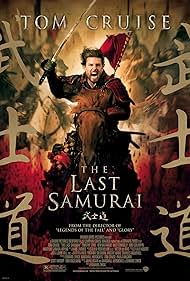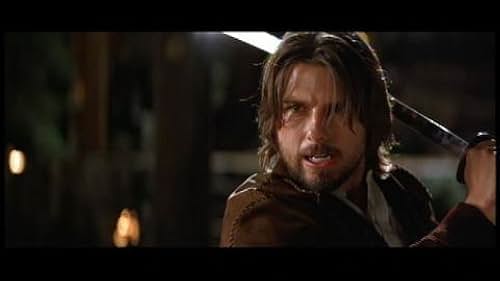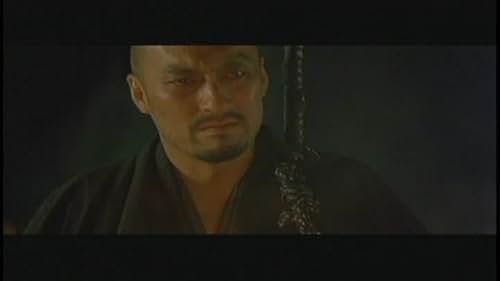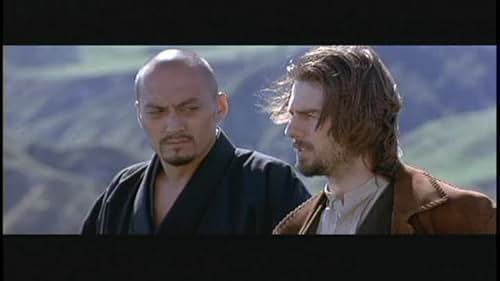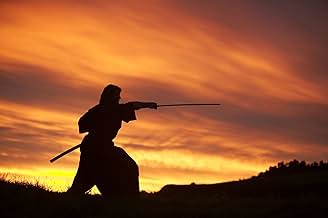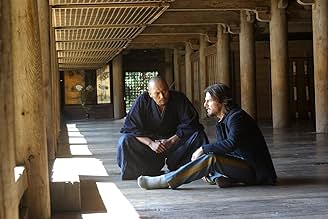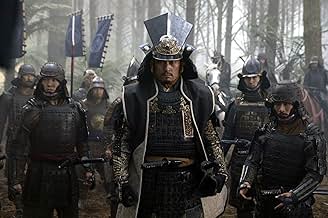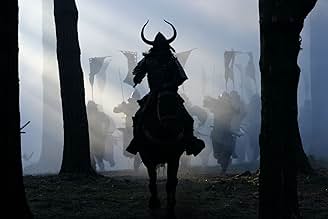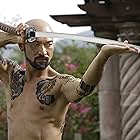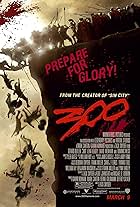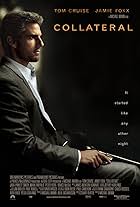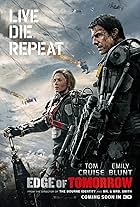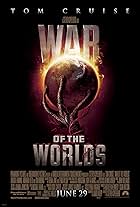In 19th century Japan, Nathan Algren, a US army captain, is hired by the Japanese emperor to train his army in the modern warfare techniques. Captain Algren finds himself trapped in a strugg... Read allIn 19th century Japan, Nathan Algren, a US army captain, is hired by the Japanese emperor to train his army in the modern warfare techniques. Captain Algren finds himself trapped in a struggle between two eras and two worlds.In 19th century Japan, Nathan Algren, a US army captain, is hired by the Japanese emperor to train his army in the modern warfare techniques. Captain Algren finds himself trapped in a struggle between two eras and two worlds.
- Nominated for 4 Oscars
- 20 wins & 67 nominations total
Storyline
Did you know
- TriviaTom Cruise spent almost two years in preparation for this movie, including swordplay instruction and Japanese-language lessons.
- GoofsAfter Katsumoto and Algren meet with Colonel Bagley and Omura before the final battle, Algren rides back into the Samurai front lines. When he dismounts his horse, the horse kicks back and hits one of the Samurai who then stumbles backwards unsure of what just happened.
- Crazy creditsThe opening Warner Bros. logo is light blue on a solid black background.
- SoundtracksKagura-No-Netori
Performed by Tokyo Gakuso
Courtesy of Columbia Music Entertainment, Inc.
Featured review
In a bid to try to improve trade links between Japan and the US Captain Nathan Algren (Tom Cruise) is hired to train an army to overthrow a rebellious group of samurai led by their leader Katsumoto (Ken Watanabe). However, the army that Algren had been training encounter the Samurai before their training has been completed and the army end up being overpowered and defeated by the highly trained Samurai. Algren is the only survivor of this battle and in recognition of his bravery and determination Katsumoto spares his life and invites him to stay with the Samurai. During his time with the Samurai, Algren learns quite a bit about their culture and eventually embraces it and fights back against those that had originally hired him to overthrow the Samurai.
Tom Cruise's performances and films tend to vary greatly in quality so I do tend to approach a lot of his films with caution. I can safely say that this is one of his better films and also one of his better performances. Cruise is well-known for bringing a sort of smug arrogance to a lot of his roles and he definitely brings some of that to his role as Captain Algren - although there's only a whiff of it here rather than full on smugness that we've seen from him before. Director and screenwriter Zwick gives Cruise a character he can really sink his teeth into - Algren is obnoxious and rude at the start and shows very little respect for his employees. He's the same with the Samurai at the start, but I think the difference is that the Samurai show him respect and allow him to embrace their culture. The general saying in life is that to 'gain respect you must first give respect' and I got the feeling that this was one of the messages contained within this film.
The first 20 minutes or so of this film are slick and fast-paced, but the momentum does slow down where Algren is staying with the Samurai. Although the pace slackens at this point the film never becomes boring and Algren's narrative and the exploration of the Samurai culture were interesting enough to keep me involved with the story. The only criticism I have with this aspect of the story was when the ninjas attacked the Samurai - I just didn't see the point of it and it also seemed to add nothing to the story, but this really is a minor criticism.
Much like Seven Samurai, The Last Samurai is a slow-burning film that rewards the viewers patience with a spectacular closing act that is epic, clever and heart-breaking. Technical aspects of the film are also superb most notably the beautiful Japanese scenery and wonderful cinematography.
Clearly there are some politics involved here, but the politics are side-lined for the most part to make way for an interesting story about one man identifying more with an alleged 'rebellion' group over his own people. I've no idea how much of this story is true - it certainly references real life people such as General Custer and real-life events such as the battle of little bighorn, but never says anywhere that it's based on a true story. Truth be told, it doesn't matter to me whether the story is true or not because the film has a good story, it's moving at times, it's beautiful to look at, has some wonderful performances and to top it all the final battle is fantastic. Therefore it's very much worth seeing on its own merits.
Tom Cruise's performances and films tend to vary greatly in quality so I do tend to approach a lot of his films with caution. I can safely say that this is one of his better films and also one of his better performances. Cruise is well-known for bringing a sort of smug arrogance to a lot of his roles and he definitely brings some of that to his role as Captain Algren - although there's only a whiff of it here rather than full on smugness that we've seen from him before. Director and screenwriter Zwick gives Cruise a character he can really sink his teeth into - Algren is obnoxious and rude at the start and shows very little respect for his employees. He's the same with the Samurai at the start, but I think the difference is that the Samurai show him respect and allow him to embrace their culture. The general saying in life is that to 'gain respect you must first give respect' and I got the feeling that this was one of the messages contained within this film.
The first 20 minutes or so of this film are slick and fast-paced, but the momentum does slow down where Algren is staying with the Samurai. Although the pace slackens at this point the film never becomes boring and Algren's narrative and the exploration of the Samurai culture were interesting enough to keep me involved with the story. The only criticism I have with this aspect of the story was when the ninjas attacked the Samurai - I just didn't see the point of it and it also seemed to add nothing to the story, but this really is a minor criticism.
Much like Seven Samurai, The Last Samurai is a slow-burning film that rewards the viewers patience with a spectacular closing act that is epic, clever and heart-breaking. Technical aspects of the film are also superb most notably the beautiful Japanese scenery and wonderful cinematography.
Clearly there are some politics involved here, but the politics are side-lined for the most part to make way for an interesting story about one man identifying more with an alleged 'rebellion' group over his own people. I've no idea how much of this story is true - it certainly references real life people such as General Custer and real-life events such as the battle of little bighorn, but never says anywhere that it's based on a true story. Truth be told, it doesn't matter to me whether the story is true or not because the film has a good story, it's moving at times, it's beautiful to look at, has some wonderful performances and to top it all the final battle is fantastic. Therefore it's very much worth seeing on its own merits.
- jimbo-53-186511
- Nov 15, 2015
- Permalink
Details
- Release date
- Countries of origin
- Official sites
- Languages
- Also known as
- El último samurái
- Filming locations
- Production companies
- See more company credits at IMDbPro
Box office
- Budget
- $140,000,000 (estimated)
- Gross US & Canada
- $111,127,263
- Opening weekend US & Canada
- $24,271,354
- Dec 7, 2003
- Gross worldwide
- $454,627,263
- Runtime2 hours 34 minutes
- Color
- Sound mix
- Aspect ratio
- 2.39 : 1
Contribute to this page
Suggest an edit or add missing content
